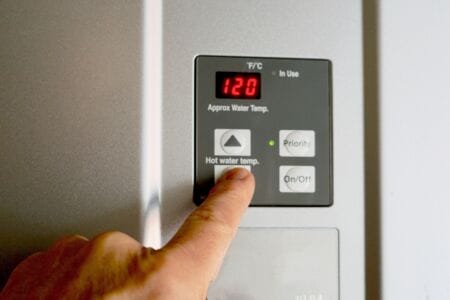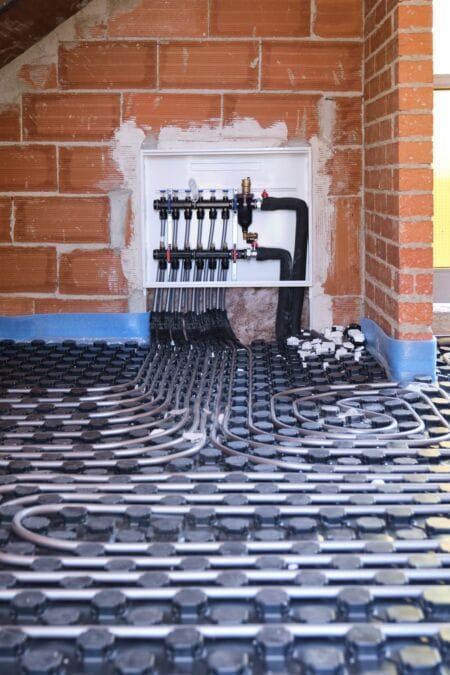Table of Contents
Contents
ToggleWhat we'll cover...
The properties and advantages of several different radiator materials, explaining which type of radiator material is best for your home, which styles are most efficient and more.
Is choosing the right radiator material important?
When shopping for a radiator, chances are that the first thing that catches your eye is the style, size, or finish, rather than what it is made out of. After all, it’s just metal that heats up, right?
Not entirely.
Selecting the material for your designer radiators isn’t just heating geekery. It has a big impact on how fast your room warms up, how long it remains warm, how energy-efficient your heating is, and even how heavy your radiator is for installation.
So, whether you’re upgrading a new home or simply tired of the living room taking longer to heat than a pie in a lukewarm oven, this guide will help you figure out which radiator material is perfect for your home, habits and heating goals.
Radiator materials compared
Let’s break down the most popular radiator materials and how they perform based on the qualities that matter most.
Cast iron radiators
Classic, chunky, and cooler than an Oasis vinyl reissue. Cast iron radiators are built to last and radiate heat long after your boiler calls it a night.
Heat retention ★★★★★
Cast iron is the king of slow-cooling properties. Once a cast iron radiator gets hot, it stays hot for hours. Ideal for homes that need a provision of steady warmth, even when the heating’s been switched off.
Heat-up time ★★☆☆☆
On the flip side? Cast iron does take a while to get going, more so in comparison with other types. With heating up times sometimes exceeding 30 minutes in extreme cases, you’ll need to plan ahead with your heating routine; no instant toastiness here.
Weight & Installation ★☆☆☆☆
These units are heavy. Like “you’ll-need-a-mate-and-possibly-a-chiropractor” heavy. Installation can be a bit of a mission, so consider that and any potential disruption in your budget and overall decision-making process.
Efficiency ★★★★☆
A slow heat-up process is offset by brilliant heat retention attributes, which makes cast iron radiators surprisingly efficient for certain homes. Put simply, they will continue to kick out heat a while after the central heating has been switched off.
Lifespan ★★★★★
Built like tanks. A cast iron radiator, when looked after with proper maintenance, could outlive your boiler. Indeed, it is suggested that properly maintained cast iron radiators can work for centuries, in which case you could find yourself sitting on highly valuable cast iron heating assets.
Best for: Period properties, traditional interiors, or anyone who likes their heating to keep working long after the pub shuts its doors for the evening.
Aluminium radiators
Lightweight, quick to heat up, and dripping with contemporary flair. Aluminium radiators are the techy choice.
Heat retention ★★☆☆☆
Aluminium cools down quickly once the heating is turned off. Not ideal for homes that lose heat fast.
Heat-up time ★★★★★
Aluminium radiators heat up practically instantly. Perfect if you’ve forgot to set the thermostat to its usual timed schedule.
Weight & installation ★★★★★
With an extremely lightweight profile, aluminium radiators are particularly simple to install. They’re a great option for spaces with plasterboard walls or highly positioned mounting.
Efficiency ★★★★★
Heats up fast, doesn’t use much water, and responds quickly to thermostatic control from smart thermostats. All in all, aluminium scores very high on efficiency points.
Lifespan ★★★☆☆
Provides good longevity, with a typical lifespan between 15 and 20 years, although aluminium can be prone to internal corrosion if your system isn’t maintained properly and regularly.
Best for: Modern properties, zoned heating systems, and households that require heat immediately.
Mild steel radiators
The all-rounder. Mild steel is the most common material for radiator construction in UK homes and makes up a great array of designer radiator styles and sizes.
Heat retention ★★★☆☆
Middle of the road. Mild steel holds onto heat reasonably well, but not to any wild extent. Beats aluminium in this regard, but pales in comparison to cast iron.
Heat-up time ★★★☆☆
Not the fastest option, but by no means sluggish. A nice balance for everyday heating usage. Again, they rank somewhere in the middle, heating up quicker than cast iron but slower than aluminium.
Weight & installation ★★★☆☆
A heavier material than aluminium but much lighter than cast iron. A relatively straightforward and manageable option for most installers.
Efficiency ★★★☆☆
Solid, consistent performance. Not the most efficient, but rarely disappointing.
Lifespan ★★★☆☆
Durable, but more likely to suffer corrosion than aluminium if maintenance measures are neglected.
Best for: You can scarcely go wrong with selecting mild steel radiators for most households – especially those placing an emphasis on style and budget over cutting-edge tech or vintage aesthetics.
Different radiator materials for different situations
Here’s a quick summary of which radiator material is for you, depending on your situation:
- Fast-heat lovers: Choose aluminium
- Long, steady warmth: Cast iron’s your best mate
- Budget-conscious renovators: Mild steel hits the sweet spot
- Modern heating tech setups: Aluminium wins again
- Restoring a period property: Cast iron for style and substance
If you’re fitting new radiators as part of a larger renovation, you should also consider your boiler type and wall structure. For example:
- Plasterboard walls? Avoid cast iron. Your wall will struggle to cope with the weight and structural damage could occur.
- Underfloor heating setup? Aluminium radiators respond faster, complementing the zoned efficiency of an underfloor heating system.
- Solid brick walls in a draughty Edwardian villa? Cast iron will keep that long heat glow you need along with an on-point aesthetic.
Radiator material comparison table
|
Material |
Heat-Up Time |
Heat Retention |
Weight & Installation |
Efficiency |
Lifespan |
Best For |
|
Cast Iron |
★★☆☆☆ |
★★★★★ |
★☆☆☆☆ |
★★★★☆ |
★★★★★ |
Traditional homes, long heat |
|
Aluminium |
★★★★★ |
★★☆☆☆ |
★★★★★ |
★★★★★ |
★★★☆☆ |
Modern, responsive heating |
|
Mild Steel |
★★★☆☆ |
★★★☆☆ |
★★★☆☆ |
★★★☆☆ |
★★★☆☆ |
Everyday homes, variety |
Select your perfect radiator material with BestHeating
Ultimately, choosing your perfect radiator material is a decision that blends heating performance, installation needs, and what looks best under your bay window altogether.
At BestHeating, we stock a wide choice of radiators made from aluminium, cast iron and mild steel across designer, traditional, and vertical and horizontal ranges. Whether you’re going for modern minimalism or classic comfort, we’ve got a solution to match your material and style.
Let us know which radiator material you opted for in your own heating glow up in the comments below, or reach us to us through Instagram, Facebook or X.
John is a Research Specialist for the Best Heating Advice Centre, where for over nine years he has dedicated himself to demystifying home heating for our customers. He specialises in creating clear, data-driven guides and how-to articles by collaborating directly with our team of certified heating experts and product engineers.
His work, built on a foundation of journalistic research, has helped millions of readers make confident and informed decisions about their home heating. When he’s not breaking down the heat output differentials from radiators to heated towel rails, John fancies himself as a fine football and music connoisseur.








